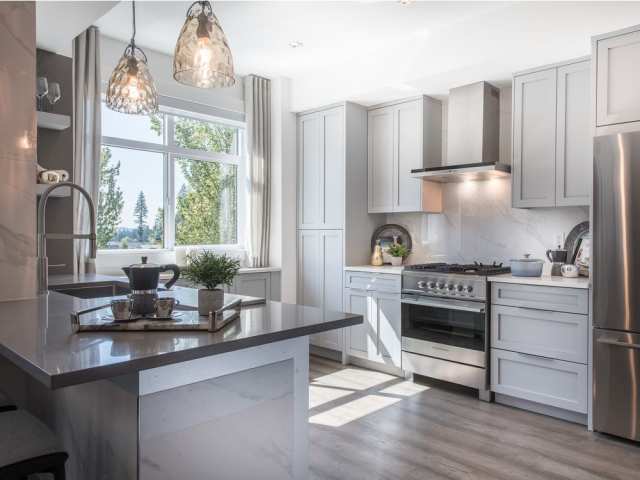Roof decks a standout feature at 3535 Princeton
Simon Briault
The Vancouver Sun

3535 Princeton is a project from Nordel Developments in Coquitlam. [PNG Merlin Archive] PNG
Nordel Developments is building a collection of high-end townhomes on Coquitlam’s Burke Mountain. Rod Byrnell and wife Debra bought one of the homes in the development — it’s called 3535 Princeton — and when he was asked what appealed to him about the project, said: “Probably everything.”
But top of the list for Byrnell, along with presumably many others, is the private rooftop patio, which every plan will have.
“These homes are unique in this area,” said Michelle DesRosiers, vice-president of projects at Fifth Avenue Real Estate Marketing Ltd., which is marketing the project. “They’re not your typical three-storey townhomes. They have beautiful, 180-degree views of the Lower Mainland. You can see as far as Surrey and Delta and towards the Port Mann Bridge.”
Byrnell, who describes himself and his wife as downsizers, said that the home they’ve bought will have views from every level. He was also appreciative of the service he got from the developers during the buying process.
“We were a little bit nervous only being able to see plans and renderings,” Byrnell said. “But the developer was incredible going through it with us and answering our questions. When we decided that we were going to buy, they were very easy to work with. One example was a mirror that my wife wasn’t too excited about. They overheard us talking about it and volunteered to change it without us even asking. You don’t often see that kind of thing in condo or townhouse developments. It’s usually a case of ‘this is the way it is, take it or leave it.’”
Byrnell is set to take possession of his new home at 3535 Princeton early next year. Once complete, the development will have a total of 27 three- and four-bedroom homes ranging from 1,314 to 2,405 square feet. Prices start at $754,900.
“Nordel Developments is part of Nordel Group, a company that has been building homes for more than three decades,” said DesRosiers. “They pride themselves on building quality homes with long-lasting value. They’ve developed mostly in the Fraser Valley in places like Surrey, Langley and Maple Ridge. But they’ve also been active in Alberta and on Vancouver Island.”
A highlight of the homes at 3535 Princeton is, of course, the private patio (weight-loaded to allow for hot tubs, by the way), but the developer has also not held back on the interior finishes.
“They’ve really tried to build these homes to be anything but cookie cutter,” said DesRosiers. “So, they included things like forced-air heating, air conditioning, engineered hardwood, feature walls, electric fireplaces, built-in cabinetry for your entertainment system and natural gas barbecue hookups. These are the type of things you would normally only find in a custom, single-family home and they’re included in the price.”
Kitchens will have grey Shaker cabinetry with soft-close hardware, large pot drawers and pantry space. Wrapped in large-scale tile, kitchen islands are complemented by soft accent lighting and there are quartz countertops, large-scale tile backsplashes, and undermount sinks. The appliance packages are by Fisher & Paykel and include freestanding gas ranges with canopy hood fans, counter-depth french door refrigerators with water and ice, and double-draw dishwashers.
Most ensuite bathrooms will have double vanities. Other bathroom features include chrome faucets with black accents, five-foot walk-in showers with smoked, frameless glass and floor-to-ceiling textured tile. There are pedestal soaker tubs surrounded by floor-to-ceiling textured tile in larger homes and dual-flush, single-piece toilets.
“Most of our buyers are from the immediate area, but we have also seen some coming in from North Vancouver,” DesRosiers said. “I think they probably identify with the natural setting here – you’ve got Burke Mountain with trails and creeks nearby and we back right on to protected green space.”
“It’s a very North Shore type of setting,” DesRosiers added. “It’s a step away from the urban centre, but the nice thing is that they are going to be building Burke Mountain Village, which will give residents opportunities to do some everyday shopping within a five-minute walk of our site.”
According to the City of Coquitlam’s website, the village is expected to include up to 120,000 square feet of commercial space, a major recreation complex with community centre, public plaza, integrated multi-use trail network, and a public park. All of this is music to the ears of Rod and Debra Byrnell, who will take possession of their new home close by early next year.
“Our children and grandchildren are in that area so that was important to us,” Byrnell said. “The other thing is that we both grew up in Coquitlam and we had to move out to Maple Ridge many years ago because we couldn’t get into the market in that area. Now we’re moving back and it’s kind of like coming home.”
3535 Princeton
Project location: 3535 Princeton Avenue, Coquitlam
Project size: 27 three- and four-bedroom townhomes, 1,314 — 2,405 square feet
Pricing: from $754,900
Developer: Nordel Developments
Architect: Focus Architecture
Interior designer: Giraffe Design
Sales centre: Home 2 — 3535 Princeton Avenue, Coquitlam
Sales centre hours: noon — 5 p.m., Sat — Wed
Sales phone: 604-468-8298
Website: http://www.3535princeton.com
© 2019 Postmedia Network Inc.





